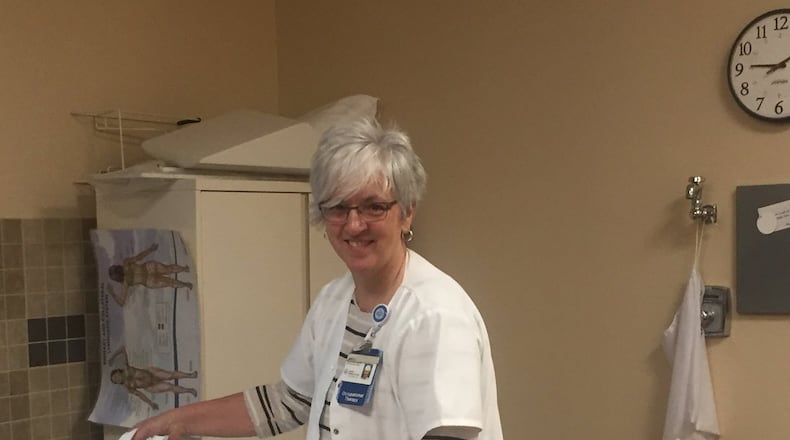Lymphedema is an incurable health condition, but one that can be controlled with the right care. It normally creates unusual swelling in a patient’s arms or legs.
“The lymphatic system is a significant part of our immune system,” said Harrison. “It is the ‘drainage system’ of our bodies. Without it we would swell like a ripe tomato in the sun and burst.”
The Miami Valley had minimal lymphedema therapy options in the 1990s and into the mid-2000s.
Around that time, Harrison was a hand therapist/occupational therapist in the Dayton area.
“I did not treat lymphedema until years later when I worked with an O.T. in private practice,” she said.
In 2007, Harrison became certified, and she now works at Atrium Medical Center, off Interstate 75, in the Middletown and Franklin area. She is the lead therapist of three certified lymphedema therapists. Treatment is provided every day, by appointment.
She was certified through Klose Training, one of the premier lymphedema centers in the United States.
”I also did advanced training in Germany with the Folidi Clinic, a treatment and research center in Hinterzarten, Germany. Continuing Education is a vital part of this practice,” she said.
Harrison had lived in Beavercreek for 20 years but after her husband’s death moved back to Waynesville to assist her father with his care.
She loves volunteering at the Waynesville Historic Society and also enjoys working at the Pioneer Village in the Caesar’s Creek area.
Harrison’s prior experiences has been varied over the 40-plus years in occupational therapy.
“I have been in the school system, extended care facilities/home health, rehab centers, 18 years in hand trauma/rehab, and now lymphedema treatment and management,” she said. “I trust the experiences learned show up in my daily treatment of patients.”
Lymphatic fluid is different from swelling due to injury. It is a protein-rich fluid that will draw water back to itself. The lymphatic swelling almost always comes back to the area of injury.
The gold standard for treatment, according to Harrison, is manual lymphatic drainage and complete decongestive therapy, which includes skin care, manual lymph drainage massage, compression wrapping and garments, exercise and nutrition.
Harrison said she supports the Lymphedema Treatment Act that is being presented in Congress.
“This bill will help in research and treatment funding,” said Harrison. “I try to convey that the medical community is just now recognizing, acknowledging and wanting to do something for their (our) patients.”
Lymphedema treatment is carried out by a certified lymphedema therapist who is a nurse, massage therapist, occupational or physical therapist. Insurance usually covers the treatment by the occupational or physical therapist.
Besides therapy, patients need information on how to get resources and networking.
“My deepest desire for individuals and their families is to know what is going on and how to manage it,” said Harrison. “Knowing how to get to resources, networking with others who manage this, as well as, knowing where to go when the health care professional is needed, allows for an increase in peace of mind for living life.”
For a lymphedema appointment, contact the clinic at Atrium Medical Center at 513-974-4523. To talk to a certified lymphedema therapist, leave a name and number, and Harrison will return the call.
Contact contributing writer shirl54bel@gmail.com
About the Author

